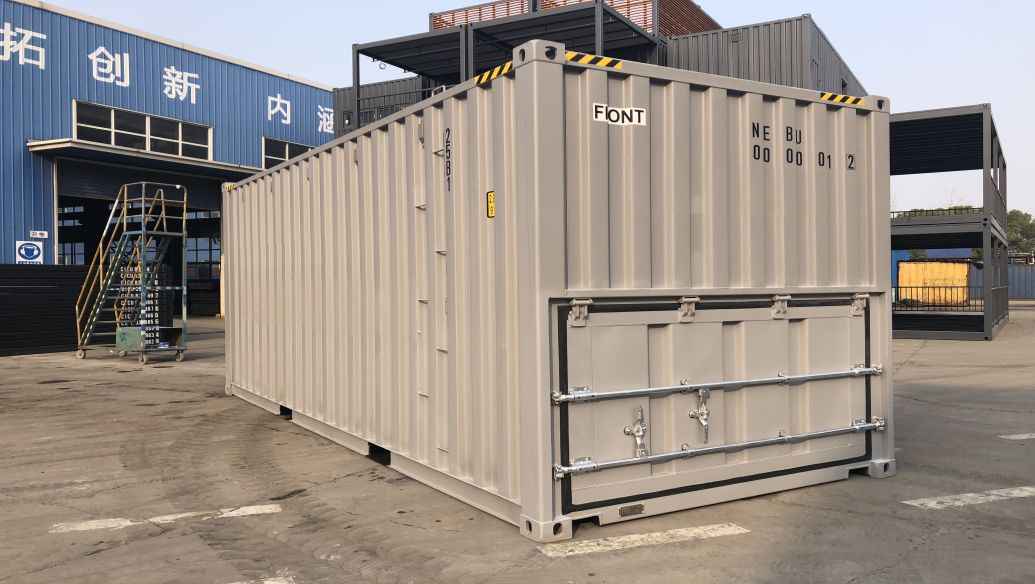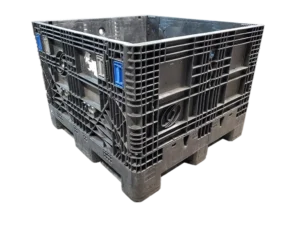Why refurbished bulk containers are smart solutions for sustainable businesses
Wiki Article
The Ultimate Guide to Selecting the Right Bulk Containers for Your Organization Demands
Picking the suitable mass containers is vital for any kind of company that counts on effective logistics. Different kinds of containers exist, each made for details products and applications. Aspects such as dimension, product compatibility, and regulative requirements play a substantial function in this decision-making process. Understanding these components can cause boosted functional efficiency. Nonetheless, many organizations neglect vital facets that could boost their total performance and sustainability. What are these considerations?Comprehending Various Kinds Of Mass Containers
Mass containers act as vital tools for services looking for effective storage and transport services. These containers come in various types, each developed to satisfy certain functional requirements. One typical kind is the intermediate bulk container (IBC), which is optimal for granulated and fluid products, using an equilibrium of ability and maneuverability. An additional preferred alternative is the bulk bag, or FIBC, suitable for completely dry, flowable products. These adaptable containers are lightweight and can be conveniently moved and kept. For much heavier materials, inflexible mass containers are commonly utilized, providing toughness and stability for risk-free handling. Additionally, there are specialized containers tailored for dangerous materials, making sure conformity with safety regulations. Recognizing the distinct qualities of these bulk container kinds permits businesses to make informed decisions that optimize logistics and minimize expenses. By selecting the best container, companies can enhance their functional effectiveness and improve their supply chain processes.Key Material Considerations for Bulk Containers
When picking bulk containers, it is necessary to consider the materials utilized in their building. Aspects such as toughness, chemical, and toughness compatibility play a critical duty in making sure the containers fulfill certain functional requirements. Additionally, weight and portability problems can influence both performance and transportation logistics.Product Sturdiness and Stamina
Resilience and toughness are essential variables in selecting products for mass containers, as they straight affect the container's ability to hold up against numerous ecological conditions and dealing with procedures. Products such as high-density polyethylene (HDPE), polypropylene, and stainless-steel are frequently favored for their robust homes, using resistance to temperature, impact, and abrasion fluctuations. The choice of product likewise influences the overall life-span of the container; stronger products commonly result in less regular substitutes, leading to cost savings gradually. Additionally, the weight of the material can influence delivery expenses and ease of handling. Organizations should consider their certain operational atmospheres and the possibility for deterioration to ensure peak resilience and strength in their bulk container selection.Chemical Compatibility Factors
Comprehending chemical compatibility is essential for selecting bulk containers, as the products used must resist the details substances they will certainly hold. Different aspects influence compatibility, consisting of the chemical nature of the materials, temperature level, and period of storage. Harsh chemicals may require containers made from stainless steel or specialized plastics that resist degradation. Furthermore, reactive substances can generate heat or gases, necessitating aired vent or pressure-rated containers. The selection of container product, whether steel, polyethylene, or polycarbonate, need to align with the chemical homes of the saved substances to avoid leakages or breaches. Ultimately, a comprehensive analysis of these compatibility aspects ensures safe handling and storage space, shielding both employees and the environment while keeping product integrity.Weight and Mobility Concerns
Selecting bulk containers involves not only assessing chemical compatibility yet also thinking about weight and transportability. Services have to analyze the ease of handling and transportation to optimize effectiveness. Lightweight products like high-density polyethylene (HDPE) or light weight aluminum can facilitate simpler activity and minimize shipping expenses. Alternatively, larger containers may give improved toughness yet can hinder flexibility, specifically in settings calling for frequent relocation. Additionally, the style of the container ought to permit practical training and piling, making sure ergonomic safety and security for workers. Companies must additionally consider the framework available for transportation; for instance, containers suitable with forklifts or pallet jacks can simplify procedures. Ultimately, the right equilibrium in between weight and transportability directly affects operational performance and price performance.Sizing Your Bulk Containers for Optimum Efficiency
When sizing mass containers, organizations must meticulously evaluate the dimensions called for to fit their specific items. Additionally, weight ability is an essential variable that affects performance and security throughout transportation and storage space. Effective sizing not only optimizes area however also optimizes functional workflows.Identifying Container Dimensions
Choosing the best measurements for bulk containers is vital for maximizing efficiency in storage and transportation. Companies need to evaluate their specific demands, considering elements such as offered room, the nature of the items being saved, and the approaches of transportation used. Precise measurements guarantee that containers fit preferably in cars and warehouses, lessening lost space and lowering managing time. Standard sizes can use benefit, yet customized measurements may be required for unique demands or to fit specific products. Furthermore, it is essential to assess piling capacities and availability, as these variables affect general functional efficiency. Eventually, the appropriate dimensions bring about improved company and streamlined logistics, benefiting the total performance of business.Weight Ability Considerations
Understanding weight capacity is important for organizations intending to optimize their mass container effectiveness. The weight ability of a container straight impacts storage capacities, transport logistics, and overall operational expenses. Choosing containers with the proper weight limits assures that companies can safely save and deliver their items without risking damage or compliance problems. Overwhelming containers can lead to structural failings, while underutilizing capacity outcomes in squandered resources. It is vital for businesses to examine their item weights and consider any kind of governing demands when choosing containers. In addition, variables such as the type of material, planned use, and ecological conditions need to additionally affect weight ability choices. By reviewing these aspects, companies can improve efficiency and ensure a streamlined supply chain.Governing Compliance and Security Criteria

Regulatory compliance webpage and safety and security standards play a crucial duty in the option of mass containers for companies. Organizations has to ensure that their containers meet different policies set by regional, nationwide, and international authorities. These standards commonly pertain to product security, structural stability, and appropriate labeling, which help protect against mishaps and assure the risk-free transportation of items.
Furthermore, adherence to industry-specific standards, such as those from the Food and Drug Administration (FDA) or the Occupational Safety and Wellness Administration (OSHA), is crucial for business taking care of unsafe products or food products. Non-compliance can lead to penalties, legal problems, or damages to an organization's reputation.
Companies should likewise take into consideration the container's compatibility with the products being stored or transferred to stay clear of contamination or chain reaction (refurbished bulk containers). To summarize, recognizing and executing regulatory compliance and security standards is essential for the reliable and responsible use mass containers
Sustainability Options for Eco-Friendly Mass Containers

Companies are likewise exploring choices made from recycled products, which not only preserve sources however likewise support the recycling sector. Technologies in style permit for lighter containers that call for less power to transportation, better boosting sustainability. By integrating these green bulk container choices, services can show their commitment to ecological stewardship while satisfying consumer need for sustainable techniques. This shift not only aids the earth yet can additionally boost brand credibility and customer commitment.
Cost-Effectiveness and Budgeting for Bulk Containers
While many businesses concentrate on sustainability, cost-effectiveness continues to be a crucial factor when choosing mass containers. Organizations must examine the first purchase cost, as well as lasting operational prices, to assure monetary viability. Factors such as resilience, reusability, and upkeep play a considerable function in determining overall costs.Investing in top notch containers might produce higher upfront expenses yet can cause cost savings via reduced substitute rates and lowered waste. Additionally, businesses should think about transport prices and storage effectiveness, as these can influence the overall budget.

Regularly Asked Questions
Just how Do I Identify the Right Container for Hazardous Products?
To figure out the right container for unsafe products, one must evaluate compatibility with the material, take into consideration the container's product, home look for regulative conformity, and analyze capacity and safety features to guarantee proper handling and storage space.Can Mass Containers Be Customized for Certain Products?
Yes, bulk containers can be customized for particular items. used collapsible containers. Numerous features, such as material, design, and dimension, can be tailored to fulfill distinct demands, guaranteeing suitable safety and security and efficiency for carrying and keeping various goodsWhat Is the Average Life Expectancy of Various Bulk Container Types?
The average lifespan of mass container types differs; plastic containers last 5-10 years, metal containers 10-20 years, and wooden containers commonly last 3-7 years, depending on use, maintenance, and environmental problems.How Should I Tidy and Maintain Bulk Containers?
To clean up and keep bulk containers, one must regularly inspect for damages, eliminate residue, clean with proper detergents, rinse thoroughly, and warranty appropriate drying before storage space. Adhering to supplier guidelines enhances longevity and safety during usage.Are There Rental Options for Mass Containers Available?
Yes, many firms offer rental alternatives for bulk containers, providing versatility for businesses. These services can fit various demands, enabling business to manage inventory efficiently without the commitment of buying containers outright.Resilience and toughness are essential elements in picking materials for bulk containers, as they straight affect the container's capacity to hold up against numerous ecological conditions and taking care of processes. Understanding chemical compatibility is vital for picking bulk containers, as the products used have to resist the certain materials they will certainly hold. Understanding weight capability is essential for businesses intending to optimize their mass container efficiency. Governing conformity and safety requirements play a necessary duty in the option of bulk containers for businesses. While numerous services focus on sustainability, cost-effectiveness continues to be a vital element when picking bulk containers.
Report this wiki page